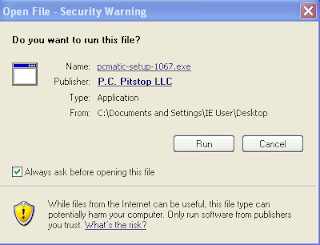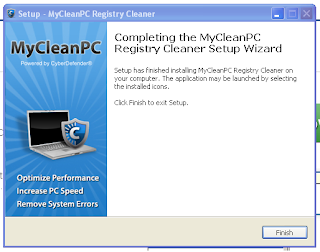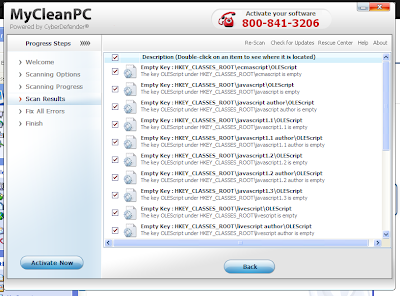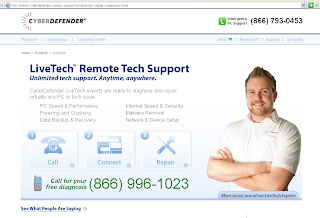You've seen the commercials. They've been on nearly every channel and more so in the recent weeks and months. They claim to be the "magic bullet" to solving your computer problems. While the results sound good, I was skeptical and set out to discover for myself if this service was all it was cracked up to be.
--- Open the Pod Bay Doors, HAL ---
Let me first start off by saying that I didn't just navigate over to this company's website, install their software and let 'er rip. And, I do not recommend you do either. I first downloaded virtualization software which allowed me to create a computer within my computer. It sounds strange, but it's possible with a little know-how. With this "computer in a computer" (which I'll call HAL for fun), HAL can get as sick as he wants and not affect my physical computer, which I'll call George (because I'm not that creative). So I now have HAL who was happy to accept a brand spanking new Windows XP installation and happily ran inside of George (like in that movie Aliens except without all the messy side affects). Now, I care a great deal about George, he's my best buddy. But, George's new alien parasite, HAL, while useful, well, I have no emotional attachment to him and could care less if he gets sick and even dies. That might sound bad, but let's remember, HAL is a "simulated computer" running inside of George, and I can recreate HAL again with a few simple keystrokes.
--- Exploring The Great Unknown ---
HAL now had his new Windows XP installation, no virus and spam protection installed (I'm so reckless), and with a nervous look on his face, we headed over the MyCleanPC's website. In the next image below you will see what appears to be a very clean and professional looking website.

So, with reckless abandon (well, not really), I clicked on the "Start Here" button, and HAL and I were off to see the wiz....ahem...what this service had in store. The next box that popped up is below.
This notification shows that the website wants to immediately download a program into HAL that's called MyCleanPC.exe which is 4.74 MB in size. I said "ok, let's do it." HAL said "Do we HAVE to?" and we moved on. The next warning that HAL and I received is the typical dialog box that always asks if you are abso-floggin-lutely positive you want to run this potentially universe-ending program. Sure do!

Figure 3 - Internet Explorer Security Warning
Next, I began the installation process while HAL sat there helplessly quaking in his cyberboots. (Note to self: search internet for actual pair of cyberboots.) The following screenshots show the progression of events through the installation process of this panacea of computer problems.
I did save a copy of the EULA, if anyone is interested in it, but it seems to contain the same boilerplate user agreement text that are in many of these types of things. Next, it was time to start this program. I distinctly heard HAL whimpering and George began to chuckle. The next image below shows that when this program was started, it immediately began scanning my system.
I thought this was a bit rude. Normally, programs of this nature introduce you to the program and provide you some options about how it operates. "Greetings, Progr.....hey now just where do you think you're going?" I could tell from the messages that were wizzing past that this program was scanning my Windows registry entries. This is a good thing to do, but it seems that is all that this particular program does. (Note to self: Report this program to the Master Control Program then save the girl.) A proper analysis of computer issues involves more than just a registry scan as every good computer geek knows.
--- Happy Halloween - Trick or Trick! ---
You can see the results of the scan below, and it was just as I expected...because I keep my expectations low when it come to these quick fix solutions. To the non-computer geek, your first response may have been some along the lines of Holy compu-crap, Batman! ...or something quite similar. HAL had already started filling out his last will and testament and was calling George to say his good-byes and reminisce about the old times back a few minutes ago.
Well folks, what you have here is what I like to call "scareware." A program that scares you into buying it by providing you information like the above which leads you to believe your poor HAL or George is very, very sick. Soon, thoughts of "Peggy" in a far off country ordering a new Mercedes on your credit card begin to rush through your mind. With trembling fingers you click on each of the error messages above and see the following screens for each one.
Looks bad, eh? To provide even more unease, clicking on each individual error message launches the Windows Registry editor (image below) where that particular registry error resides. If you only know the registry as someplace you renew your driver's license then your head is spinning by now.
--- Where's the Antacid? ---
That sick feeling in your stomach begins to grows larger and in your panic you click on the "Fix All My Problems" button. You begin to feel better. This pretty green button makes you feel safer and gives you hope that all will soon be well. You are then immediately whisked away from the emergency room waiting area into the triage office (their website) and presented with the following.

Here the doctor explains to you that with a little minor surgery (on your wallet), you can be right as rain. I think you see where this is going. For nearly $40, you can solve your problems. But wait folks! There's more! I've read further horror stories on the internet of other victims shelling out hundreds of dollars for live support which they actually do get. However, if you remember, my HAL was created brand new. He had a fresh installation of Windows XP and only two program installed (both of which I know to be ok). Yet, MyCleanPC found 114 errors. Hard to believe? Not really. There are many of these types of programs out there just looking for a fat wallet to skinny down. (Where's Tron when you need him?)
--- The Monkey's On My Back! ---
Living with this program installed on your machine does not appear to be too instrusive, but I did not spend much time seeing what programs it may affect or how it may affect the overall performance of the machine it is installed on. It does provide you with a new taskbar icon with the letter "C" on a shield, the first icon show below.
Which is used to launch the program window allowing you to "scan" your computer again if you ask it to. It will also create two new desktop icons that also lead back to either the program or the company's website. They are the first and third icons on the desktop shown below.
The program finally admits its a registry editor when you launch it for the second time yourself. It provides you with options for scanning and then happily scans away. Interestingly, the second time I scanned I only had 113 errors when I originally had 114. At least it's consistent. (Yes, HAL that was sarcasm. Relax. You weren't badly hurt, only emotionally scarred.)
A few other items of interest are left. When you click on the About in the menu bar, you are given the following window.
When you click on the Rescue Center, you are again whisked away to the web and presented with this handsome-looking fellow ready to help you - for a price.
--- Taking Out The Trash ---
To my surprise, uninstalling the software was relatively painless. I expected (as typically happens with other scareware) that the program would be more difficult to remove or leave behind programs running in the background waiting to spring up and remind me how many problems I have with my computer. Below are the screenshots of the uninstall process which nagged me a bit but final resigned itself to the cyber-afterlife.




---I Don't Smell Anything Bad ---
Finally, just to be sure I used a well known malware scanner to make sure HAL was clean of this troublesome little program. The results showed clean, so it appears that at least there are no traces of it left behind to nag you.
--- Inserting Shameless Plug Here ---
So, for those of your thinking your might give this company a try, I would recommend you don't. There are many other Internet resources and people (like me and my buddy HAL) you can trust that would better serve to resolve your computer issues than these guys. Your comments here are welcome. Wishing you Safe and Happy Computing!
Warm Regards,
Michael J. Karg
www.kargcustomcomputing.com
































































